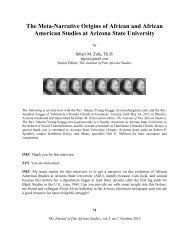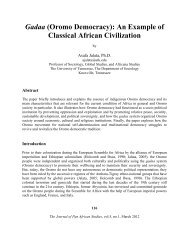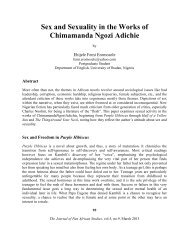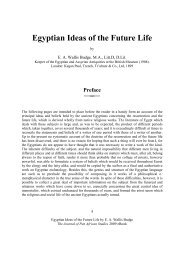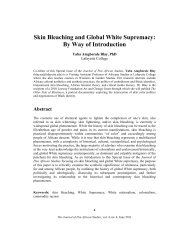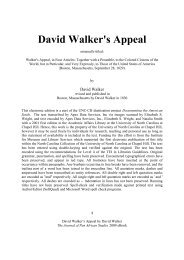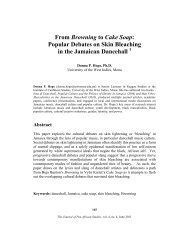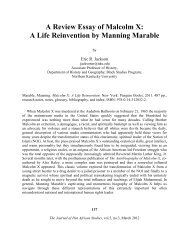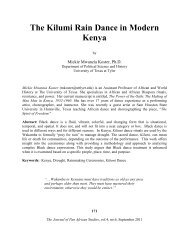Jacob H. Carruthers and the African - Journal of Pan African Studies
Jacob H. Carruthers and the African - Journal of Pan African Studies
Jacob H. Carruthers and the African - Journal of Pan African Studies
You also want an ePaper? Increase the reach of your titles
YUMPU automatically turns print PDFs into web optimized ePapers that Google loves.
vocational training to <strong>the</strong> <strong>African</strong> masses. The second str<strong>and</strong> was <strong>the</strong> establishment <strong>of</strong> institutions<br />
<strong>of</strong> higher education that trained an <strong>African</strong> American elite. With regards to <strong>the</strong> first str<strong>and</strong>, what<br />
should be noted is that this vocational education was seldom relevant to current labor market<br />
trends <strong>of</strong> <strong>the</strong> current levels <strong>of</strong> technological development at <strong>the</strong> end <strong>of</strong> <strong>the</strong> 19th Century <strong>and</strong> <strong>the</strong><br />
beginning <strong>of</strong> <strong>the</strong> 20 th Century (Anderson 1988). Thus we can surmise that <strong>the</strong> principle objective<br />
<strong>of</strong> <strong>the</strong> architects <strong>of</strong> this system was something o<strong>the</strong>r than preparation for <strong>the</strong> burgeoning<br />
industrial labor market. <strong>Carru<strong>the</strong>rs</strong>’ contention is that <strong>the</strong>ir objective was <strong>the</strong> maximum<br />
subordination <strong>of</strong> <strong>the</strong> <strong>African</strong> masses (<strong>Carru<strong>the</strong>rs</strong> 1995; <strong>Carru<strong>the</strong>rs</strong> 1999). In one way this became<br />
a tool for <strong>the</strong> suppression <strong>of</strong> <strong>African</strong> American labor. In ano<strong>the</strong>r way it became a means <strong>of</strong><br />
intellectually enfeebling <strong>the</strong> Black masses through <strong>the</strong>ir deeducation, which it was believed<br />
would make <strong>the</strong>ir subordination all but inescapable.<br />
The second str<strong>and</strong> <strong>of</strong> this bifurcation was focused on creating <strong>the</strong> educated <strong>African</strong><br />
American leadership who could be trusted to perpetuate <strong>the</strong> interests <strong>of</strong> <strong>the</strong> White elite by<br />
ensuring <strong>the</strong> suppression, mis-direction, <strong>and</strong> neutralization <strong>of</strong> <strong>the</strong> masses. Building upon<br />
Woodson’s <strong>the</strong>sis <strong>Carru<strong>the</strong>rs</strong> attempted to connect <strong>the</strong> process <strong>of</strong> mis-education among <strong>African</strong>s<br />
in <strong>the</strong> United States with <strong>the</strong> colonial enterprise <strong>of</strong> Europeans in Africa centuries earlier<br />
(<strong>Carru<strong>the</strong>rs</strong> 1994, 43-45;<strong>Carru<strong>the</strong>rs</strong> 1999, 255). In a basic sense he argued that mis-education<br />
was a means <strong>of</strong> co-opting <strong>and</strong> redirecting <strong>African</strong> American leadership. However, because he<br />
maintained that ideation <strong>and</strong> action were intimately wedded to worldview, he insisted that <strong>the</strong><br />
process <strong>of</strong> mis-education had to be one <strong>of</strong> worldview transmission (<strong>Carru<strong>the</strong>rs</strong> 1994, 52-54).<br />
Thus in this sense, mis-education was a tool for <strong>the</strong> reproduction <strong>of</strong> <strong>the</strong> European worldview in<br />
<strong>the</strong> minds <strong>of</strong> <strong>the</strong> educated <strong>African</strong> elite who, if sufficiently mis-educated, would pursue <strong>the</strong><br />
interests <strong>of</strong> Europeans to <strong>the</strong> detriment <strong>of</strong> <strong>African</strong> well-being. Lastly, he maintained that <strong>the</strong><br />
perpetuation <strong>of</strong> this careful balance <strong>of</strong> deeducating <strong>African</strong> masses <strong>and</strong> mis-educating <strong>African</strong><br />
elites was essential for <strong>the</strong> maintenance <strong>of</strong> White control, White supremacy (<strong>Carru<strong>the</strong>rs</strong> 1999,<br />
253-257).<br />
Finally, <strong>Carru<strong>the</strong>rs</strong> did not believe that this system <strong>of</strong> control had ceased to exist in <strong>the</strong><br />
wake <strong>of</strong> desegregation in <strong>the</strong> 1960s, or <strong>the</strong> gradual erosion <strong>of</strong> <strong>the</strong> vestiges <strong>of</strong> <strong>the</strong> state-sponsored<br />
m<strong>and</strong>ate for racial subordination, o<strong>the</strong>rwise known as segregation. Instead, he argued that <strong>the</strong>se<br />
systems were alive <strong>and</strong> well (<strong>Carru<strong>the</strong>rs</strong> 1994, 48-50; <strong>Carru<strong>the</strong>rs</strong> 1999, 253-255). For instance,<br />
while <strong>the</strong> “achievement gap” remains a great preoccupation for many scholars who study <strong>African</strong><br />
American education, <strong>Carru<strong>the</strong>rs</strong> argued that this gap <strong>and</strong> its underlying challenges are to be<br />
expected. This manifestation <strong>of</strong> deeducation is simply <strong>the</strong> result <strong>of</strong> an intergenerational process<br />
<strong>of</strong> psychological assault coupled with <strong>the</strong> systemic dismantling <strong>of</strong> <strong>the</strong> social structure <strong>of</strong> <strong>the</strong><br />
<strong>African</strong> American community (<strong>Carru<strong>the</strong>rs</strong> 1999, 253-254; Shujaa <strong>and</strong> Afrik 1996; Wilson 1993).<br />
Moreover, he maintained that this pernicious state <strong>of</strong> affairs is augmented by <strong>the</strong> impotence <strong>of</strong><br />
mis-educated <strong>African</strong> American intellectuals to construct a liberating <strong>and</strong> <strong>African</strong>-Centered<br />
paradigm that would facilitate <strong>the</strong> empowerment <strong>and</strong> Re-<strong>African</strong>ization <strong>of</strong> <strong>the</strong> masses<br />
(<strong>Carru<strong>the</strong>rs</strong> 1994, 51-52).<br />
39<br />
The <strong>Journal</strong> <strong>of</strong> <strong>Pan</strong> <strong>African</strong> <strong>Studies</strong>, vol.5, no.4, June 2012



